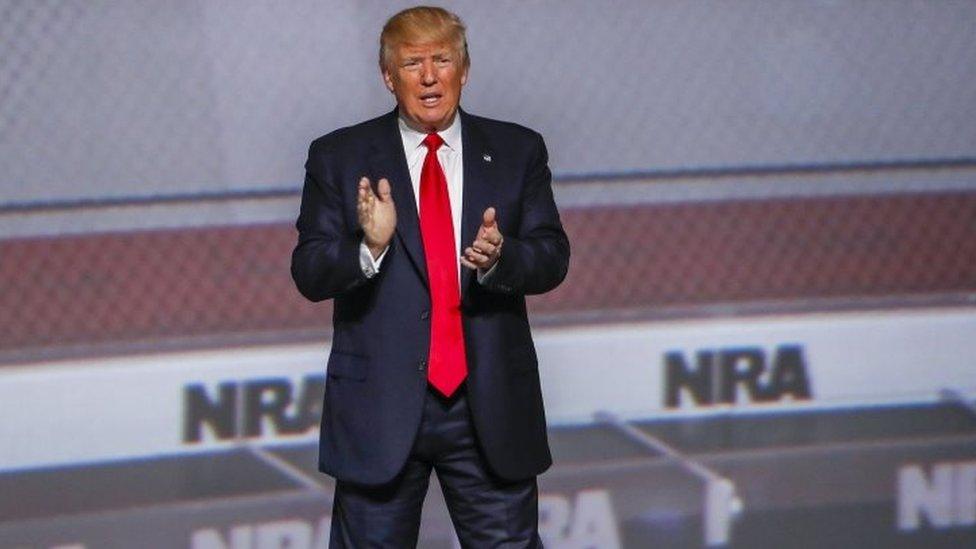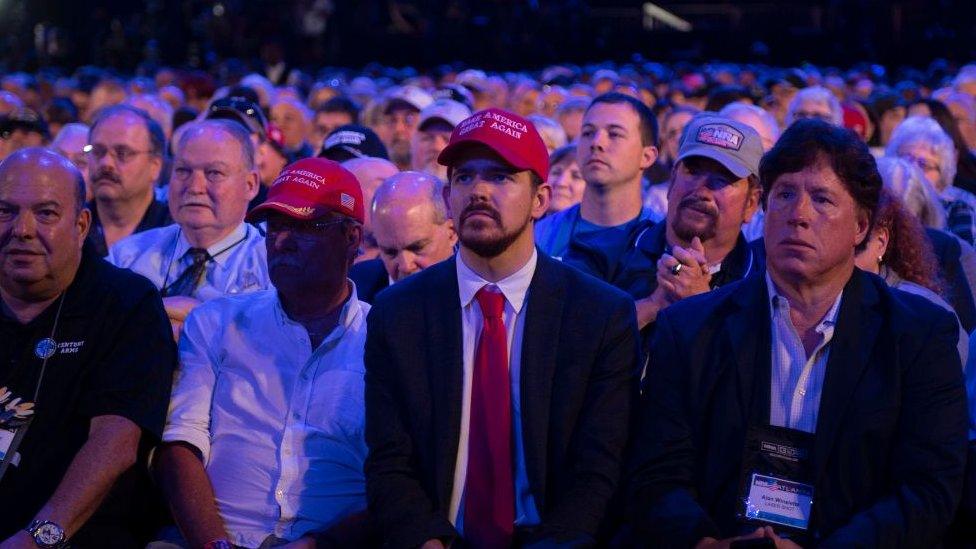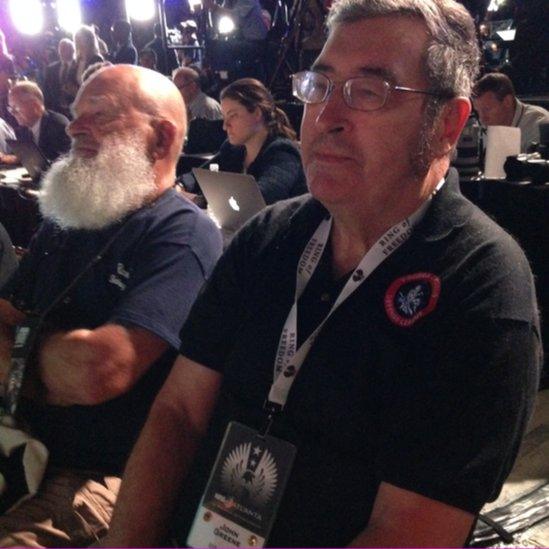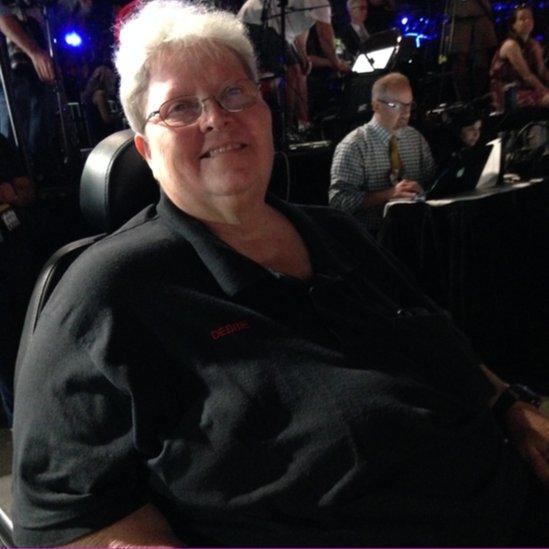Trump reassures US gun owners
- Published

Donald Trump: "I will never, ever infringe on the right of the people to keep and bear arms."
Donald Trump stood at a podium in front of an Atlanta auditorium full of gun lovers.
"You are my friends," he told them.
"The eight-year assault on your Second Amendment freedoms has come to a crashing end," he said.
A woman in the back of the auditorium shouted: "Thank you." A moment later a man took off his red Make America Great Again cap, waved it in the air and put it back on his head so he could clap with both hands - loudly.
Others in the 10,000-strong audience (National Rifle Association figures) - cheered.
Trump talked about Justice Neil Gorsuch and Attorney General Jeff Sessions and Interior Secretary Ryan Zinke, all of whom, the president made clear, support the Second Amendment.
He also spoke about his intentions: "Let me make a simple promise," he said. "I will never, ever infringe on the right of the people to keep and bear arms."
He didn't make any policy announcements, however, or discuss at any length legislation that's important to NRA leaders, such as the Concealed Carry Reciprocity Act, which would make permits to carry concealed weapons valid across the nation.
He spoke only in generalities, breezing over specifics about firearms policy.

NRA members want fewer restrictions on firearms
Still, he made the event feel like a "victory party", just as Arsenal Attorneys' Matthew Bergstrom, who was speaking at a firearms seminar that afternoon, predicted he would.
In the midst of the festive atmosphere, however, there were unresolved issues, and the relationship between Mr Trump and gun owners has been complicated.
The president likes to hold his cards close to his chest, and he often changes his mind.
This is true in the realm of foreign policy, trade deals and firearms policy too. In the past he's shown support for an assault weapons ban. Last year he reversed his position.
His fluid ideas about firearms policy have vexed those who care about the issue, whether they support fewer restrictions on gun owners or more.
Gun control is an emotionally raw issue in the US, where mass shootings have become surprisingly common.
Most Democrats think Americans would be safer with fewer guns, according to a McClatchy-Marist poll, external.
Near the convention hall, a woman in khaki shorts held up a sign: "No Trump. No NRA. No guns."
Most Republicans, however, believe Americans would be safer if there were more guns. Meanwhile, NRA executives want fewer restrictions on firearms.
With that goal in mind, the NRA gave $30m (£23m) to Trump's presidential election campaign. Now he's their president. When it comes to the NRA's positions, though, he's been low-key.
Since taking office, he's struck down an Obama-era rule that would have made Social Security Administration officials add names of people who suffer from mental health problems and receive disability support to a database of individuals who cannot purchase a gun.

NRA member John Greene (right) says President Trump "has been rather busy, doing a lot of things"
Beyond that, he hasn't done much in terms of firearms policy.
"For $30m?" said Brendan Kelly, a spokesman for the Brady Campaign to Prevent Gun Violence, a Washington-based organization, referring to the amount of money the NRA gave to his campaign.
"The only thing he's done is repeal a law."
Mr Kelly is being sarcastic: he doesn't want Trump to follow the NRA's guidance and lift restrictions on firearms.
He wants the president to sign laws that will impose more rules on gun purchases and is disappointed in the way he's changed his mind about firearms policy.

Debbie Anderson: "I think you have to give him (Trump) time"
Donald Trump once argued for stricter rules on gun purchases, and now he talks enthusiastically about the Second Amendment (and doesn't mention gun control).
"The inconsistencies get in the way," says Mr Kelly. "He's bouncing back and forth, and people are dying."
He wishes the president would argue for more restrictions on gun purchases. But that seems unlikely.
At the same time, it seems unlikely that the president will push for new policies loosening the restrictions on guns.
Activists at both ends of the political spectrum - from left to right - said they have been disappointed in the president.
For many of those at the convention, however, the policies were relatively unimportant. They said they were happy he'd come and liked the fact that he was surrounded by people whom they see as sympathetic to their cause.
Kellyanne Conway, a top adviser to the president, spoke to a women's group at the event.
Flying on Air Force One, she told me she'd grown up hunting and used to bring home wild game: "You have to prove your manhood," she said, joking around.
Trump's sons Eric and Donald Trump Jr also enjoy hunting.
"They love the outdoors," the president told people in the audience. (Donald Trump Jr, who's an NRA member, reportedly owns an AR-platform semi-automatic rifle.)
Stephen Miller, the White House policy director, has reportedly talked about how much he likes guns. He flew to Atlanta with the president.
NRA members said it was important to them that the president's friends and family are fond of guns.
"That's a really big trust factor," said attorney Stephen Halbrook, who was attending the convention.
The auditorium was filled with people wearing pro-gun messages on T-shirts, hats and badges.
One man wore a ponytail with flecks of grey and a black T-shirt that said: "This is America. We eat bacon. We drink beer. We own guns. We love freedom. We speak English. If you don't like it, tough shit."
They clapped loudly during the speech and seemed OK with the president's policy positions (or lack of them).
"I think you have to give him time," said Debbie Anderson, an NRA pistol instructor who was dressed in black (with a US flag bracelet). "He can't get everything done in one day."
Another person in the auditorium, John Greene, an NRA member who lives in Virginia Beach, agreed: "He's been rather busy, doing a lot of things."
In theory at least, the president was passionate about his commitment. "I will never, ever let you down," he said.
A moment later he left, and the NRA members went back to the business of the convention: talking about guns and hanging out with their friends.
Follow @Tara_Mckelvey, external on Twitter